
|
The Non Smokers' Movement of Australia | |||
|
Protecting the rights of the Non-smoking majority from
tobacco smoke and from the tobacco industry's propaganda. |
||||
| | Home Page | About | Publications | Newsletters | Campaigns | <Search | | ||||
Issue 54, July - August 2006
|
SMOKING AND PREGNANCY - A DOUBLE WHAMMY FOR BABY
Smoking kills - we have known this for more than 50 years. Death and disease from smoking are entirely preventable. And yet, a recent report from the Australian Institute of Health and Welfare found that in the year 2003, smoking was more prevalent in teenage mothers (42%), compared to 10.9% of mothers over 35. Almost 40% of pregnant women in remote areas smoked compared with 14% of women in major cities. Information from NSW Dept. of Health: What happens to your unborn baby when you smoke? Together, carbon monoxide and nicotine make it harder for the baby to get the oxygen and nourishment needed, as well as placing unnecessary stress on the baby's heart. 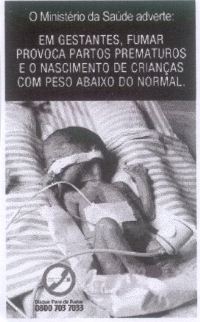
Newborn baby In addition, mother and baby are exposed to 4,000 other harmful substances when the mother smokes. Smoking might seem to relax the mother, but the feeling is actually the relief from withdrawal symptoms which are temporarily eased when nicotine levels are topped up. 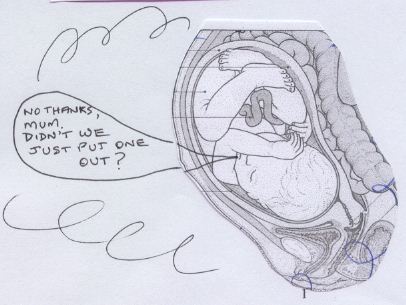
In the womb.... NSMA calls on all Australian Governments to make effective regulations to protect unborn babies from the deadly and widely recognised effects of tobacco. * Ban smoking indoors, near entrances, and at all children's outdoor venues. * License retailers and prosecute heavily when caught selling to minors. * Prosecute adults supplying tobacco to minors. * Mass media quitting campaigns, especially for regional areas.. * Free quit therapies (including drug-free) and ongoing counselling, especially for pregnant teenage smokers... * Low-cost community exercise, weight-control, and healthy body programmes for teenage mothers and babies. * Stop glamorising tobacco use, especially in magazines and films aimed at teenagers. * Put tobacco out of sight wherever sold. * Defend families against smoking assault from neighbours. * Ban smoking in vehicles, protecting driver, passengers, other road-users, and the environment. * Declare smoking in the presence of children as physical and emotional child abuse. [Child abuse - Any form of physical or emotional mistreatment or mismanagement of a child, by acts or omissions that cause actual or potential harm to the child's health, well-being or development, or expose the child to unnecessary risk or suffering.] Editorial Every small victory for clean, smoke-free air is not only a breath of fresh air, but it keeps that fresh air flowing, and encourages others to speak up for their rights. The big steps, such as statewide smoking bans and graphic warnings on cigarette packets, are often the result of many years of protest and lobbying. Small steps, such as persuading a hospital to move smokers to Designated Outdoor Smoking Areas, or ensuring a cafe stays smokefree outdoors on council land, can be achieved fairly quickly, sometimes with a short letter and follow-up meeting. Over the past few months, with our serious family health problem continuing, I have needed to hold back on the usual NSMA activities with the exception of the important NSW and Tasmanian submissions. It has been gratifying, however, to hear of the ongoing victories of our partners in Smokefree Australia, and of the activities of some of our members around the country. Non-Smokers' Movement's prime issues remain: smokefree homes and cars, protection from smoking neighbours; smokefree workplaces (indoors and outdoors), smokefree public transport waiting areas; smokefree outdoor recreation areas for all children, smokefree crowded outdoor areas, such as sporting and concert events; smokefree CBDs (Central Business Districts) and reducing smoking rates for all ages, in all parts of Australia. We welcome suggestions on the most effective ways to reduce the tobacco toll especially amongst indigenous Australians. Margaret Hogge, President Congratulations, Simon Chapman, Professor of Public Health at Sydney University for his award earlier this year. He was presented with the 2006 President's Award from the Thoracic Society of Australia and New Zealand, for outstanding service in tobacco control. Former recipients of the award are Helen Clark, Prime Minister of New Zealand, Anne Jones, CEO of ASH (Action on Smoking and Health), and our NSMA Founder, Brian McBride. 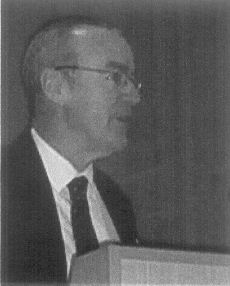
Simon Chapman More about smoking neighbours - As previously advised, we have available a series of sample Strata Corporation By-Laws for NSW, prepared by a solicitor who specialises in Strata Law. Members may use these by-laws with the proviso that they register them through our solicitor who prepared them on our behalf. Some advice for all home-owners and tenants when your home is being invaded by secondhand smoke from neighbours. 1. Firstly, write a short polite note advising that, despite the fact that tobacco is a legally available product and that they may feel they can use it in their own home, the smoke from that product is causing you and your family health problems and great distress and that you request them politely to smoke where their smoke won't affect others, especially children and others who may be allergic to the poisons in secondhand smoke. They would be aware that smoking is banned indoors in all public places and in many outdoor places, especially near children's play areas and congested areas and sporting stadiums. This is not primarily because the smell is offensive but because even a small amount of secondhand smoke can trigger deadly asthma attacks and heart and lung conditions. Children are particularly susceptible due to their underdeveloped respiratory capacity. 2. Keep copies of all correspondence. Send a copy to your local State MP and State Minister for Health, requesting their assistance and support in this matter. 3. Keep a diary of any incidents, and of any medical visits connected with this matter, including stress conditions. 4. Protect yourselves by blocking smoke from coming into your home - things won't change overnight. If necessary, use draught-excluders and foam around doorways and have a small fan blowing smoke away from your entranceway or other openings.. 5. Take photographs of every measure you take to protect yourselves from the smoke. 6. Try to remain calm, don't shout or make unnecessary noises nor do anything which allows the smokers to point blame at you for any minor transgressions. Eg if you have a pet, make sure you keep the area nearby clean and that the pet is kept reasonably quiet. That is, show that you are being reasonable and that you expect respect for your rights in return. They have every right to expect clean water to come out of the taps in their home. You have the same rights, and expectations, for clean air. Smokefree Pubs and Clubs around Australia This year, 2006, at last saw total smoking bans pubs and clubs in Tasmania.
Congratulations to all involved, campaigners, politicians, and legislators, for progress at last, in some areas of Australia. Let's promise ourselves not to take so long in establishing smoke-free cars and homes. An Australian Bureau of Statistics report from Tasmania, shows a 10% increase in employment in pubs and clubs in the May quarter 2006 compared to the same period in 2005. More importantly, workers and patrons are able to breathe freely, are no longer victims of discrimination due to secondhand smoke, and smokers will find it easier to escape from their addiction to nicotine. The farcical definition of outdoors which is to become part of ACT, NSW and Victorian legislation continues, with areas which are 75% enclosed being defined as "outdoors" Dr. Arthur Chesterfield-Evans' (MLC) bid for a complete ban in pubs and clubs has been defeated in the Upper House. A group of protesters was ejected from the public gallery for lighting up cigarettes. The protest showered ridicule on the Parliament, as was fitting. Let's not forget that "The Great Persuader" Mr. John Thorpe, then leader of Australian Hotels Association NSW responded in an interview with Quentin Dempster earlier this year, after discussing how much his industry had contributed to Labor Party coffers, that democracy isn't cheap. Mr Thorpe's own pub displays an astonishing lack of regard to workers' and patrons' health and safety, with the main bar being divided by an invisible line into smoking and non-smoking areas so that every body is consistently surrounded by secondhand smoke. To top this off, the live entertainment is placed in the centre of the designated smoking area. That's true consideration for workers' welfare, don't you agree? 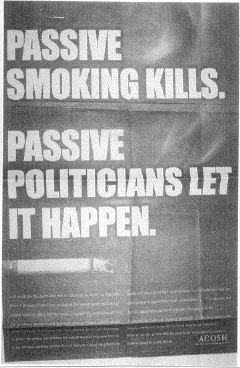
Passive Smoking Poster NSW Parliament's Joint Select Committee Inquiry into Tobacco Smoking Several NSMA Members attended and spoke passionately about their particular tobacco-related experiences and of every body's rights to clean air. Extract from NSMA Submission and Presentation to NSW Government Committee."We also call on the government. to assist people to protect their rights to clean air in their homes. .... Nobody should have to barricade themselves and their families into their homes to avoid assault from their neighbours' secondhand smoke...... 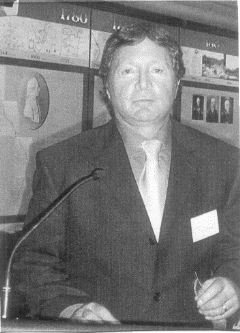
NSMA Member Peter Lavac In conclusion, I wish to speak to all Members of Parliament through this committee. If I understand it correctly, you owe your parliamentary duty not to your party sponsors (that would smack of bribery) but to all the people of NSW, including, of course, all the children, disabled people and the frail aged. Show them you are willing to stand up against the murderous tobacco industry which sells a product which would immediately be banned if it were introduced into society today. The Committee's report has been tabled, with strong dissenting statements from Dr. Arthur Chesterfield-Evans (a former President of NSMA), and The Rev. Hon. Fred Nile, both objecting to major weaknesses and delays in controlling tobacco's toll. See http://www.parliament.nsw.gov.au/tobaccosmokingcommittee Tasmania: Strengthening Measures to Protect Children from Tobacco Extract from NSMA Submission: We congratulate the Government of Tasmania for progress in smokefree workplace legislation to date, especially since 1st January this year when Tasmania became the first State in Australia to eliminate smoking in all enclosed public places, including bars. Governments have been aware of the dangers of secondhand smoke for twenty years. Occupational Health and Safety laws call for smokefree workplaces because there is no safe level of secondhand smoke. The US Surgeon-General, in a highly significant report published in June 2006 makes this statement, as a result of twenty years research. "There is no risk-free level of secondhand smoke exposure. Only smoke-free environments effectively protect non- smokers from second-hand smoke exposure in indoor spaces." Additionally, an Australian study from the Woolcock Institute regarding asthma and children concludes "We're left with not having any strong evidence, apart from the avoidance of environmental tobacco smoke, about things that can be done to prevent the onset of asthma in children". We call on the Government of Tasmania and all Australian Governments, at local, state and federal levels to immediately do everything possible to protect those who are unable to speak up to defend themselves from the dangers of secondhand smoke, nor to remove themselves from smoky environments. These are the children, the disabled and the frail-aged, whose smaller and frailer bodies are vastly more vulnerable and susceptible to assault from secondhand tobacco smoke than the workers and clients whom these governments have legislated to protect so far. We call on you to use those same arguments - arguments for health and safety, arguments against discrimination, arguments for duty of care, arguments for basic rights to clean air, but to use those arguments with even more conviction and with considerably more speed than in the past. Please don't allow another twenty years to pass before you finally protect these most vulnerable (albeit "voiceless and voteless") members of our communities. SOUTH AUSTRALIA TO REGULATE ON SMOKING IN CARS Consultation in near future on this issue plus Point of Sale advertising, increase in license fees, and sales to minors. International News Vale, Heather Crowe, of Canada. Heather Crowe, a waitress for 40 years in smoke-filled restaurants, contracted lung cancer from exposure to second-hand smoke (a very similar case to that of Australian Marlene Sharp, who bravely fought for and won her legal rights in court ). Canada's heroine died in May this year aged only 61. She was diagnosed in 2002 and with courage and determination she told her story in nation-wide campaigns aimed at educating Canadians about the dangers of secondhand smoke.. Scotland Scotland's hospitality industry went smokefree indoors on 26th March 2006, with very high compliance rates in the first 3 months. The bans have also been widely accepted by the Scottish public. Maureen Moore, CEO of ASH (Action on Smoking and Health) Scotland was awarded an OBE for services to health care. Ireland Report from Ireland on the second anniversary of the pub smoking bans, which started in March 2004. Professor Luke Clancy, Chairman of ASH Ireland : "The introduction of the ban [in Ireland] has been hugely successful because the Irish people have promoted it. Its continued success must be guarded carefully and preserved for the Irish workers. The Irish example has been followed in several countries throughout the world, most recently Scotland. We look forward to an all- Ireland smoke free workplace ban next year and a similar ban to follow in England and Wales. Nobody now doubts that an EU wide ban is possible. What a difference a couple of years can make in such an important health issue. Let's press on with tobacco control. Read my Lips ! ! US Surgeon-General Report, June 2006 "THERE IS NO SAFE LEVEL OF SECOND-HAND SMOKE" In his 640 page report, the first in 20 years on secondhand smoke, Dr Richard Carmona, reveals that the only way to protect non-smokers is to ban smoking in public places. Secondhand smoke is not a mere annoyance. It is a serious health hazard that can lead to disease and premature death in children and non-smoking adults. Also, "The good news is that, unlike some public health hazards, secondhand smoke exposure is easily prevented." Editor's comment : Yeah, right !! Not while tobacco sponsors political parties and tobacco tax revenues aren't tied to prevention campaigns. Smoke-free Beijing Olympics 2008 China has vowed to organise a non-smoking Olympic Games in Beijing in 2008, despite the fact that 350 million Chinese people smoke. China is the world's largest producer and consumer of cigarettes, with nearly 3 trillion consumed per year. Tax on cigarettes provides about 5% of fiscal revenue. The World Health Organisation estimates that tobacco kills about 1.2 million people in China per year.(Information from "China View" 30 May 2006) Smokefree town, Calabasas, California The Californian town of Calabasas has imposed a ban on public smoking, with smokers being directed to "designated smoking areas indicated by a large green sign with a hand holding a lit cigarette". Germany : Following the World Cup Soccer Australian non-smokers returning from The World Cup soccer have told of their disgust at the lack of smokefree public places in Germany. Chancellor Angela Merkelhas has since (rather belatedly)declared her support for a ban on smoking in public buildings and "better protection for non- smokers". USA In New York City, which went smokefree indoors in all public places three years ago, Mayor Michael Bloomberg has a dream - to get the rest of the world to stop smoking - he plans to donate US$125 million of his personal fortune to anti-tobacco causes worldwide. U.K. Allen Carr, who used to smoke 100 cigarettes a day, and whose clinics have, since 1983, helped smoking addicts to escape from addiction, has been diagnosed with lung cancer. Film Reports The Tobacco Conspiracy This independent documentary film by France's Nadia Collot, chillingly depicts global tobacco industry tactics. Thank You for Smoking a clever but chilling spoof on how the tobacco industry maintains its customer base, by advertising through film. Experienced smokers have been killed off by tobacco diseases and the tobacco industry needs to maintain its customer base. The Tobacco Industry Racketeering Influenced Corrupt Organisations decision US District Judge Gladys Kessler has ruled that cigarette makers are liable for a decades-long conspiracy to hide the dangers of smoking - but has declined to impose financial penalties on the industry. A previous ruling prevented the judge from imposing monetary penalties. Not surprisingly, tobacco stocks rose following the decision. Meanwhile tobacco lawyer and Bush Buddy Robert McCallum has been appointed US Ambassador to Australia. Don Laurie Case This is the case of an Australian, a Vietnam veteran, who died of lung cancer only a month after a bedside court hearing in his modest Texas (USA) home. He had smoke since the age of 9. BATAS (British American Tobacco Australia Services) is accused of deliberately encouraging people, including children and adolescents to smoke, knowing it was addictive and knowing it caused lung cancer. Anecdote:"Tobacco Smoking" From the Express, South Aust, 3 January 1873, page 2b, regarding a proposed ban on smoking "in the open air in the summer months". There is a clause in the Bush Fires Prevention Act for the same purpose but it is almost a dead letter, a conviction under it never being heard of. The practice of smoking in the open air, however, is as dangerous as it is difficult to be dealt with in a hot climate like this; and it would be carrying the law too far to prohibit the habit altogether... It would not be unreasonable, perhaps, and insist upon the use of covered pipes, which we have seen gone unmolested on the railroads in England where smoking, generally, is prohibited. This may seem to be a harsh interference with personal inclination, but extreme cases require extreme measures. |

|
The Non-Smokers' Movement of Australia Inc, Box K860, Haymarket NSW 1240. | |||
| This page was last updated on 2nd September, 2006. | ||||
| Home Page | Publications | Updates List | Top of Page | ||||